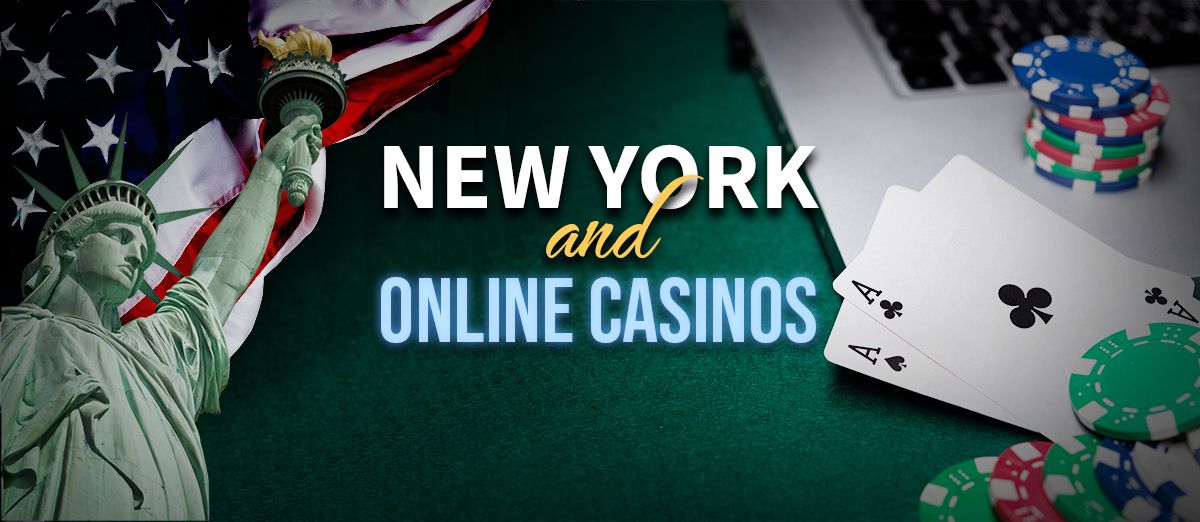Intricacies and Prospects of Online Casino Legislation in New York

In March 2023, the proposed bill to pass online casino legislation in the state of New York was rejected, however, you could not help feeling a sense of de ja vu. Especially for those in favor, this is not the first fight.
The online sports betting bill was initially rejected in the state, and Senator Joe Addabbo was all too familiar - even he admitted that it is going to be a case of ‘when’ and not ‘if’ online casino legislation is approved.
Addabbo himself was a major proponent of the New York online sports betting bill; indeed, one of the only protagonists who was vocal about the potential that it has in financial terms in the state - he was proven right, despite having his doubters.
Dominating US Online Sports Betting in Record Time
Almost overnight, New York transformed into one of the most lucrative online sports betting markets in the US, easily surpassing revenues for states that offered both this and the ability to bet at live online casinos.
Such numbers are staggering. In the first three weeks of online betting being available in New York (January 2022), every statistic exceeded expectations and then continued to do so. In total, $16.2 billion worth of wagers were made during the first year of online sports betting being legal in the state.
To put this into perspective, New Jersey - up until then, a record-setting state, took almost $11 billion worth of wagers, but for online sports betting, casinos and also, horse racing as a whole. The sheer gap is mind-boggling, particularly outlining the major potential of New York.
In online sports betting handle, New York surpassed the $1 billion mark for 10 out of 12 months - an incredible feat, two of those months being the off-season in most major sports competitions, especially the NFL and NBA - two of the biggest revenue generators.
By the end of June 2023, New Yorkers had wagered $9.1 billion, becoming the first state to breach the $25 billion sports betting handle, with New Jersey still a considerable way behind. At the close of the first six months of 2023, the wagering handle was $600 million ahead of the previous year, with the NFL and NBA seasons still yet to start.

Does It Make Sense to Pass Online Casino Legislation?
Undoubtedly one of the biggest beneficiaries of the online sports betting bill being passed in New York, has been the state coffers. In 2022 alone, the 10 brands (according to Sports Pro Media) contributed $693 million in taxation, which was a significant aid to multiple public services.
While it has the highest tax levy out of any market in the US at 51 percent, gaming regulators clearly realized this was a gamble worth taking when factoring in how much potential the market had.
Indeed, this sentiment was echoed by Rich Azzopardi - a spokesman for the former Governor of New York, Andrew Cuomo, who revealed: “What usually happens is that the industry buys the politicians, and the end result is not in the best interest of taxpayers.
They definitely tried to do with the Legislature in New York and also pushed dozens of stories claiming that our taxing structure was unworkable. Governor Cuomo didn’t believe the hype, pushed and passed his plan, and the record revenues continue to prove the special interests and the pols wrong.”
What is even more staggering is that last year’s sum is on track to be beaten this year, meaning that over $1 billion would have been generated in taxable income for New York since the implementation of proper gaming regulation.
However, since the end of the global pandemic, there have been a number of sectors in the state that have been struggling financially, in particular the Metropolitan Transportation Authority (MTA). With much of the taxable income from online sports betting last year helping more pressing issues, such as poverty, homelessness and affordable housing, the MTA is still struggling.
There was a hope that would an online casino bill pass this year, an advantageous percentage of taxable income from this sector of the online gambling industry would have been directed to helping the MTA. Had this happened, it would have meant that taxation from land-based casinos downstate could have helped the MTA.
There are concerns about passing the online casino bill, not least issues surrounding gambling addiction, which, like in most markets, continues to be an underlying problem. Indeed, a percentage of income generated from gambling taxation goes toward organizations that are dedicated to helping addicts.
Towards the end of last year, it was announced that brands had to include specific warnings in their advertisements indicating the dangers of gambling, encouraging customers to wager responsibly.
One of the staggering statistics is that states in the US where both online sports betting and online casino is an option (New Jersey, Pennsylvania, Michigan being arguably the biggest three), exceeds in terms of revenue. When considering the numbers that New York already generates for sports, online casinos could push figures to stratospheric heights in the state for both.
Main Demographics for Online Casinos in New York
It is all too easy to suggest that legislating online casino in New York would lead to a major outbreak of gambling addiction. Of course, there will always be a small percentage of any population that would struggle with this and it is certainly necessary that relevant prevention measures are in place.
However, New York is home to some of the country’s most educated people and, as a consequence, the highest earners when factoring in the state’s major sectors, such as investment banking and related financial services.
This does not automatically mean that just because there is a high level of education and disposable income, gambling addiction is unlikely to occur in this demographic.
However, a significant percentage of these are aware of the risks and, through some of their jobs (traders, bankers), gamble on a daily basis. With millions.
Even those who do not do that will have an awareness of financial acumen - essentially only gambling what you can afford to lose - something that firms are vocal about in their responsible gambling policies.
It is also easy to assume that it is just the state’s elite who are the operators’ main customers just because they earn hundreds of thousands annually. Despite New York having one of the highest costs of living in the world, salaries in the main industries are relative to combat this.
Smart Asset reported the average New York salary is between $91,000 and $107,000 (significantly higher than the national average), while a one-bedroom apartment in Manhattan can range from $4,000 to $5,000 per month.
This still does signify that those who are considered to be ‘average’ in New York, have a substantial amount of disposable income, based on their salary levels and potential rent; indicating that a considerable percentage of these may be regular sportsbook customers.
Why not license live casinos for those who don’t have an interest in online sports betting? Has New York left a significant amount of potential tax revenue on the table by not passing the bill?

Why Approve Land-Based Venues but Reject Online Gambling Bill?
It is no secret that New York has recently green lighted plans for a number of land-based casinos in the state - the most prominent one being that of developer SL Green, in association with Caesars, set to be in Times Square, following much controversy.
There is no doubt in the obvious demand for casinos in New York and, amidst the approval of the new Caesars Palace, more bids have materialised outlining proposals for further brick-and-mortar venues in various locations in the city, including Long Island, Hudson Yards and Manhattan itself. The latter is associated with the Solviev Group in partnership with Mohegan - the casino and resort operator.
It does certainly beg the question, if proposals for physical gambling venues have been approved (or indeed, are being seriously considered), then why was the online casino bill rejected?
Taxation currently stands at 10 percent of the GGR (Gross Gaming Revenue) for New York’s existing land based casinos - compared to the rate from online sports betting, this barely makes much difference to the state coffers. It was proposed that every online casino that would operate in the state would contribute 25 percent of their GGR - a significant difference.
Meanwhile, the likelihood is that online casinos would have arguably been a lot more popular, especially based on the numbers from other states. Of course, New York is considerably different, especially downtown Manhattan, which has an astronomically high footfall, when compared to central areas of other big cities in the country.
An obvious reason for not passing the online casino bill is that the state congress had already approved plans for the casino in Times Square while also having been reviewing proposals for others. As such, giving the go-ahead for more land-based casinos in addition to approving an online casino bill in such a short space of time could maybe have been labeled as reckless.
New York's Online Casino Landscape and Prospects
Certainly, there are numerous intriguing aspects and connotations of an online casino bill being passed in New York. Upon approving the online sports betting proposal, it was agreed that only 10 initial operators would be allowed to access the New York market, with two separate bids being made featuring multiple brands in each one.
If the same measure is implemented from an online casino perspective, it would be interesting to see who would come forward. Every brand that operates in New York currently has an online casino product that they offer in other states (E.g. FanDuel, DraftKings, BetMGM, Caesars).
As a result, the likelihood is that each one of these would apply for an online casino license, potentially ruling out any other interested party, due to the fact that the legislators know how to operate in New York via their sports betting product. Other factors would likely come into play, such as how they are marketed, whether they have a good track record with responsible gambling, in addition to how they interact with the community.
Any new possible entrants to the New York market may not have much of a chance - especially if the number of initial licenses is limited. Another permutation could be based on the fact that there are some online gambling brands that offer only live online casinos and do not offer sports betting.
Because of this, legislators may decide that this could be favorable to a segment of the New York market that is only interested in the online casino aspect of gambling (not sports betting) and, because of this, decide to go in this direction.
And then, there is the issue of taxes. With current operators paying 51 percent in taxation from their GGR for online sports betting, it is likely that they would then have to pay an additional tax for online casino products.
Though. If figures from other states are anything to go by, as mentioned above - the online casino product is responsible for considerably more revenue than sports betting. The potential combined numbers for a brand such as BetMGM (which won the best online casino for Michigan at the American Gambling Awards for 2022) is staggering when factoring that it is New York.
Then, there is the population to consider. According to Macro Trends, over the last three years, this figure has continued to rise, from 18,823,000 in 2021 to 18,937,000 in 2023, highlighting even more possible customers each year.

The Future of Online Casinos on the New York Market
What cannot be ignored, is the weight of Addabbo’s confidence, which by all accounts could well be warranted after his predictions about how successful online sports betting would be in the state. He has, surely, not forgotten that it took more than one attempt to have legislation passed for this.
Although an online casino bill probably won't be passed this year, Addabbo is certainly optimistic that it will be at some point. A proposal is surely in the works for next year, and those drafting it should be taking this as an opportunity to look at what is happening in the market.
This includes not only the sports betting market but also comes as a prerequisite to keep an eye on the land-based casino bids and how the new Caesars Palace performs, which could well help a future bid.
Other aspects relating to how valuable taxation could be, observing what is happening in the public sector, any potential funding cuts brought about by rising interest rates and non-farm payrolls - especially for the state’s lowest earners, who could significantly benefit from taxable income from legalizing online casinos. Being able to communicate all of this both effectively and concisely in the next proposal will be absolutely essential if the bill has any chance of being passed at all.





Review this Blog
Leave a Comment
User Comments
comments for Intricacies and Prospects of Online Casino Legislation in New York